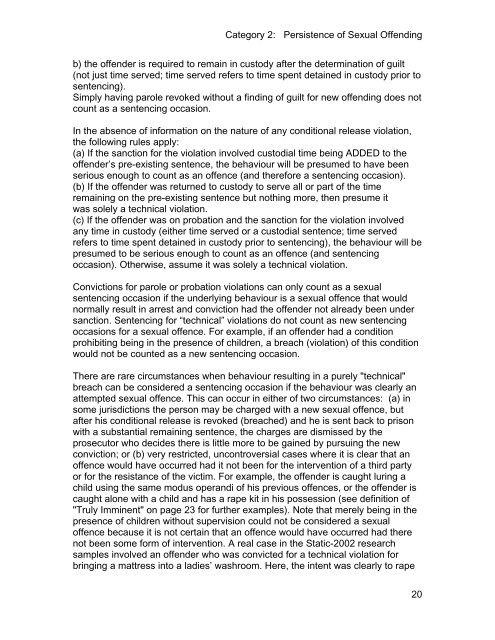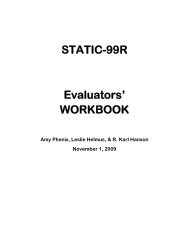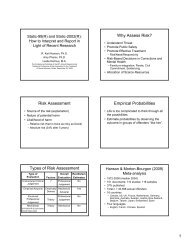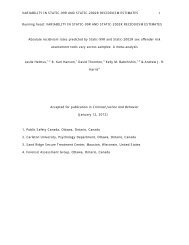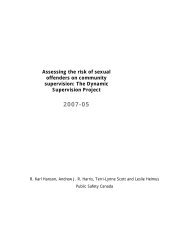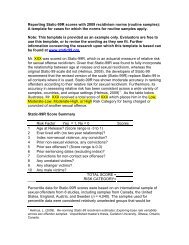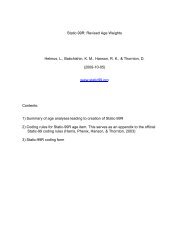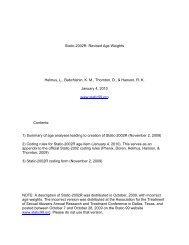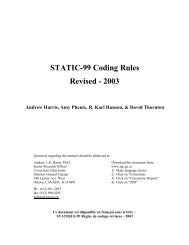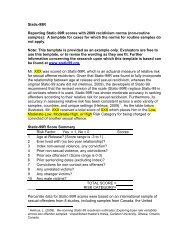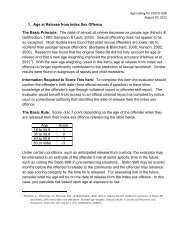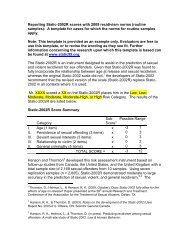Static-2002 coding rules (2009) - Static-99
Static-2002 coding rules (2009) - Static-99
Static-2002 coding rules (2009) - Static-99
You also want an ePaper? Increase the reach of your titles
YUMPU automatically turns print PDFs into web optimized ePapers that Google loves.
Category 2: Persistence of Sexual Offending<br />
b) the offender is required to remain in custody after the determination of guilt<br />
(not just time served; time served refers to time spent detained in custody prior to<br />
sentencing).<br />
Simply having parole revoked without a finding of guilt for new offending does not<br />
count as a sentencing occasion.<br />
In the absence of information on the nature of any conditional release violation,<br />
the following <strong>rules</strong> apply:<br />
(a) If the sanction for the violation involved custodial time being ADDED to the<br />
offender’s pre-existing sentence, the behaviour will be presumed to have been<br />
serious enough to count as an offence (and therefore a sentencing occasion).<br />
(b) If the offender was returned to custody to serve all or part of the time<br />
remaining on the pre-existing sentence but nothing more, then presume it<br />
was solely a technical violation.<br />
(c) If the offender was on probation and the sanction for the violation involved<br />
any time in custody (either time served or a custodial sentence; time served<br />
refers to time spent detained in custody prior to sentencing), the behaviour will be<br />
presumed to be serious enough to count as an offence (and sentencing<br />
occasion). Otherwise, assume it was solely a technical violation.<br />
Convictions for parole or probation violations can only count as a sexual<br />
sentencing occasion if the underlying behaviour is a sexual offence that would<br />
normally result in arrest and conviction had the offender not already been under<br />
sanction. Sentencing for “technical” violations do not count as new sentencing<br />
occasions for a sexual offence. For example, if an offender had a condition<br />
prohibiting being in the presence of children, a breach (violation) of this condition<br />
would not be counted as a new sentencing occasion.<br />
There are rare circumstances when behaviour resulting in a purely "technical"<br />
breach can be considered a sentencing occasion if the behaviour was clearly an<br />
attempted sexual offence. This can occur in either of two circumstances: (a) in<br />
some jurisdictions the person may be charged with a new sexual offence, but<br />
after his conditional release is revoked (breached) and he is sent back to prison<br />
with a substantial remaining sentence, the charges are dismissed by the<br />
prosecutor who decides there is little more to be gained by pursuing the new<br />
conviction; or (b) very restricted, uncontroversial cases where it is clear that an<br />
offence would have occurred had it not been for the intervention of a third party<br />
or for the resistance of the victim. For example, the offender is caught luring a<br />
child using the same modus operandi of his previous offences, or the offender is<br />
caught alone with a child and has a rape kit in his possession (see definition of<br />
"Truly Imminent" on page 23 for further examples). Note that merely being in the<br />
presence of children without supervision could not be considered a sexual<br />
offence because it is not certain that an offence would have occurred had there<br />
not been some form of intervention. A real case in the <strong>Static</strong>-<strong>2002</strong> research<br />
samples involved an offender who was convicted for a technical violation for<br />
bringing a mattress into a ladies’ washroom. Here, the intent was clearly to rape<br />
20


